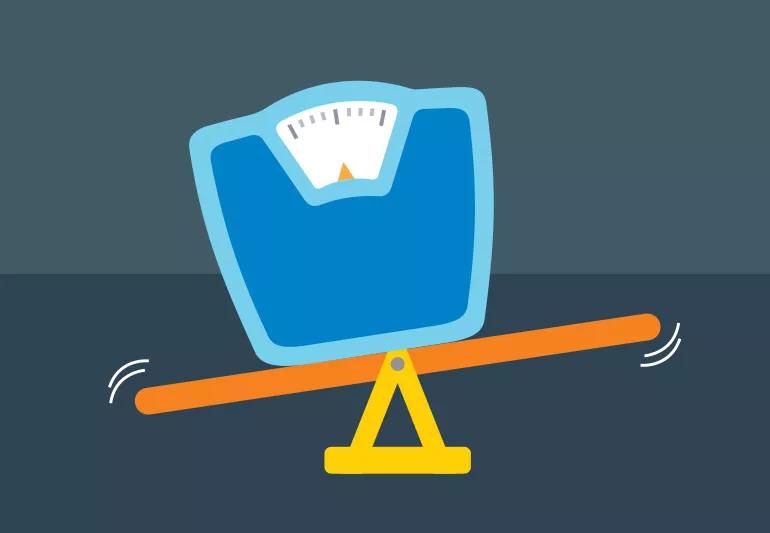Plus 4 ways to break the cycle + maintain your weight loss

Image content: This image is available to view online.
View image online (https://assets.clevelandclinic.org/transform/f41a66cc-ea6a-45ad-b315-d445b8e528f3/gainLoseWeight-1137100432-770x553_jpg)
Scale on seesaw going up and down
You — and your diet — have been firing on all cylinders. The weight is melting off, and you’re feeling your best. But then there is that seemingly inevitable backslide, with pound after pound creeping back on despite your best efforts. It’s the ultimate Catch-22.
Advertisement
Cleveland Clinic is a non-profit academic medical center. Advertising on our site helps support our mission. We do not endorse non-Cleveland Clinic products or services. Policy
But before you beat yourself up, endocrinologist and obesity specialist Marcio Griebeler, MD, has some welcome news: It’s most likely not your fault.
“Your body is fighting to keep your weight as it was before the dieting,” he says. But take heart — it’s possible to win the battle.
Experts think as many as 80 to 95% of dieters gain back the weight they’ve worked so hard to lose. Why? (WHY?!?)
Dr. Griebeler says the culprit is your “weight set point”: the weight your body is programmed to be. Your weight set point is a combination of several factors, including your:
Weight set point and metabolism play for the same team: Your metabolism burns energy at a rate that will maintain your weight set point, even if that point is heavier than is healthy.
“Most of the time, weight gain is gradual, and that can raise your set point gradually, too,” notes Dr. Griebeler. “But certain lifestyle changes can lower it.”
Beware of the quick-fix, Dr. Griebeler warns. “A fad diet won’t change your set point. It’s just restricting calories,” he says. “Your body is very efficient. You can successfully lose weight for a while, but at some point, your body simply adjusts to need fewer calories to function.”
Which means weight loss will eventually stop, unless you start eating even less than your diet calls for. (You can see where this is going.)
Advertisement
Your body is also a survivor. As soon as calories drop, it starts doing everything in its power to prevent starvation, including:
These effects stick around for the long-term. Remember the television show The Biggest Loser? Contestants still felt the effects of their calorie deprivation six years later, making it harder to keep the weight off.
“Research tells us that yo-yo dieting can negatively affect your metabolism,” Dr. Griebeler says. “It doesn’t matter the diet: low-carb, low-fat, ketogenic, whatever. We see rebound weight gain almost every time.”
To maintain weight loss for good, Dr. Griebeler advises focusing on these four areas:
Diet. How can you create a healthy, long-term, stick-with-it diet?
Exercise. Be an equal opportunity exerciser: Do both aerobic exercise (three to five times a week) and resistance training (two to three times nonconsecutively each week). Shoot for at least 25 to 35 minutes on most days.
Exercise works best for staving off weight gain (not jumpstarting weight loss), so recognize that binging on exercise can be just as bad as binging on food. “Exercise can make people super hungry, while it makes others tired and inactive, which can negate the activity they did,” Dr. Griebeler explains.
But it’s also important to remember the cardiovascular benefits of exercise, independent of weight loss. “Exercise is always good and important,” he says.
Stress. Stress not only causes some people to eat more, but it also raises levels of the stress hormone cortisol. “If you have more cortisol, you end up with higher insulin and lower blood sugar levels,” Dr. Griebeler says. (Cue the cravings.) To cope, put down the fork and try meditating or talking to a trusted friend.
Sleep. Not getting enough sleep raises cortisol levels, too. It also affects decision-making (read: your ability to stick to healthy habits). Seven to nine hours every night is the magic number you need to help you manage stress. It also helps your body work with you — and not against you — when it comes to weight loss.
Advertisement
Advertisement

Sign up for our Health Essentials emails for expert guidance on nutrition, fitness, sleep, skin care and more.
Learn more about our editorial process.
Advertisement
Depending on their size, these noncancerous growths can create an abdominal bulge
Sometimes, gaining weight is a health necessity
Study examines if alcohol habits + obesity are related
The answers may surprise you
The common hormonal condition is linked to insulin resistance, which can cause weight gain
Losing menopause weight may take more effort, but it’s doable
Diet sodas are associated with weight gain, and may even cause insulin confusion
Stress hormones trigger cravings in an attempt to keep us safe from danger
Type 2 diabetes isn’t inevitable with these dietary changes
Applying a hot or cold compress can help with pain
Pump up your iron intake with foods like tuna, tofu and turkey